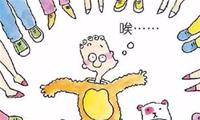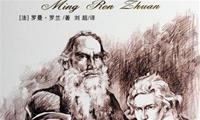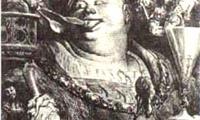居里夫人傳英文讀後感(一)
Madame Curie's succebenefits from her parents' good education. In turbulent years, what aristocrat's family background takes to her parents is lives the earth-shaking change. Her parents actually positively face the reality, optimistically and lives joyfully. They have taught Madame Curie, when facing difficulty, does not change own ambition, realizes own ideal firmly. Because the goal is just firm.
Madame Curie only then advances boldly under that difficult condition, moves toward another succefrom a success. And does not care about the money and the honor. Madame Curie experiences many difficulties are not especially unfortunate. In each person's life will have like this with such difficulty. The key is when faces the difficulty, we have made what kind of choice. The peaceful learning environment, she has not learned to study wholly absorbed in noise. Has not studied the fund, she chose herself to work as the worker, deputed gram radium with several year ……Was not the destiny changed our life, was we each one choice which made facing the life, has been doomed finally a person's succeand the defeat. reads the Madame Curie biography, what are more is becomes aware regarding the life feeling. The reason that Madame Curie is revered mother of for the science, is because she chose one to since childhood become mother's of the science path, and the goal was clear in the later each choice, the faith was firm. But our most people were premature gave up our dream, no longer had the direction, no longer made the choice for the faith. Madame Curie is a very not common woman, is a great woman, is a big wisdom woman, is human who is worth us studying well.
居里夫人傳英文讀後感(二)
Madame Curie only then advances boldly under that difficult condition, moves toward another succefrom a success. And does not care about the money and the honor. Madame Curie experiences many difficulties are not especially unfortunate. In each person's life will have like this with such difficulty. The key is when faces the difficulty, we have made what kind of choice. The peaceful learning environment, she has not learned to study wholly absorbed in noise. Has not studied the fund, she chose herself to work as the worker, deputed gram radium with several year ……Was not the destiny changed our life, was we each one choice which made facing the life, has been doomed finally a person's succeand the defeat. reads the Madame Curie biography, what are more is becomes aware regarding the life feeling. The reason that Madame Curie is revered mother of for the science, is because she chose one to since childhood become mother's of the science path, and the goal was clear in the later each choice, the faith was firm. But our most people were premature gave up our dream, no longer had the direction, no longer made the choice for the faith.()
哈姆雷特讀後感英文(一)
Created in 1600 —— 1601 Hamlet had been admired for centuries. Is to at the moment, still feel his vocal. And all this is not the plot, also not only only is excellent literary technique, it is reflected by the problem. In general,
It describes a kind of extremely primitive, people.
The hero Hamlet first dealing with your original ideal world. At the start of the benefits in some Hamlet "childhood", he did you experience any huge setback, living environment is more simple, always learning western orthodoxy. But in the end, noble, to adore the father died, less than a month is virtuous mother remarried his uncle to usurp the throne. This made him wonder in the world. And after this doubt directly contributed to his hesitation. He realized that they are not perfect it, chastity but desire, moral victory over greed. He thinks you should go to revenge, but the moral person is his mother; His uncle killed his father and he is a person, is a person's thoughts. But even if revenge success, again how? He said: "to be or not to be, this is a question worth thinking about" life is a pain, but the fear of death and have less absolute. He met a problem, can't answer is unavoidable.
Hamlet's situation is not the only, the life of big hands to hold each one is so tight.()
The old king's death, which are not related and queen. But as a woman she faces two kinds of selection, it is moral or desire. She chose the latter. However she scorned by the Hamlet and criticism, moral emptiness has brought her considerable pain, in fact, the queen is a kind person, she is not morally repugnant. She is to choose what kind of misfortune, not in the selection of your own destiny.
The new king, the uncle usurped the throne, he is the biggest villain in the play leading role. He wanted to the throne, and to the queen with desire. But the king was others. Is his brother, he don't deserve the throne. He, like all of the faces the loss of the ideal world in my heart. But he strenuously to win, but at the moment, he was a hero general spirit, he bravely to fight for originally do not belong to own. But it is also the tragedy. He paid the price, his hands stained with the blood of others, cannot repent. In later, he found Hamlet after knowing the truth, he began to save themselves may lose the happiness of life. He hovered between sin and rational, in the end he didn't jump out, died in his own sword.
Le for, and the fate of me Mr Li chardonnay with Hamlet striking similarities. In selection of to be or not to be, I am Mr Li xia chose the latter, she chose to suicide. In the selection of revenge or not, le for Hamlet is completely opposite the avengers, "so am I a noble father die in vain, so a good younger sister just this go crazy?… my revenge chance will come one day." In revenge and "inevitable" death on this matter, all of the selected point to the same destination.
Unlike Hamlet's stagnant, others struggle for action. New killed the old king, the king and tried to confess to clear their iniquity, and to attempt to kill Hamlet through to keep the throne. Le for and implement the plan together, in an attempt to let Hamlet to pay for his father's death. But in the end? The new king was dead, he might say the revenge. Le for dead, plan to fail. Hamlet died on the others for his revenge. ……
Someone said that the story of Hamlet is too far-fetched, how could all die. But that is precisely the reality. The article shows a group of people who fight against the fate to us of the final end. They try to change your fate, as a result, what also have no save. They try to restore the past, what the result. This kind of helpless, depends on each person, perhaps the biggest misfortune is man himself. "Hamlet" type of glass with each and every one, every aspect, and all the time.
Such thing as fate is a kind of existence, how he would like a shadow, and we was like peas and carrots, like sunshine and warm the heart, but more often, deep and terrible like a nightmare. "The will of god dominate everything", this sentence, there is no doubt quite penetrating.
哈姆雷特讀後感英文(二)
“To be, or not to be, that is the question”。 But after answering this question, what comes next? To be in what kind of ways may bring you the value of life? And is the value precious enough for you to continue living? These are questions that can never be solved. Hamlet chose to live, in order to revenge the tragic death of his honest father, the Danish king. On account of Hamlet was so kind, he missed the best chance of killing his uncle, the murderer of his father. The uncle, who was the new king, devised several plans to kill Hamlet, indirectly killed Hamlet’s beloved Ophelia 、 Ophelia’s brother and father, and Hamlet’s mother, the new queen who was married to his uncle. These tragedies finally forced Hamlet to make his decision, and stabbed the sword of revenge to his uncle. Unfortunately, Hamlet was already hurt by a sword with poison on it and would be dead quickly at the moment. It was the kindness and hesitation made him fail. For his father, died while having a grasping dream and went to hell for that. Hamlet didn’t kill his uncle while he was praying because if he killed him at that time, he would have gone to heaven. Hamlet didn’t want to return good for evil, this irresolute nature caused the failure of his revenge. But why would god send a person to heaven or hell only considering what he’s thinking about at the last moment of life? Is that really fair? There is no doubt that Hamlet lived in a period of time that everybody was “crazy” and everybody except Hamlet was unaware of the truth. Hamlet even had to fake madness to prevent others from having suspicion. So why being sober when everybody else is drunk? Why being normal when everybody else is mad? It’s to keep your soul clear from being stained, it’s to stop cheating yourself when the truth is already out. It’s worthwhile to die for bringing out the truth, cause living with the concealed truth is worse than dying, especially when the truth that everyone should see is buried with your own hands. “To die - to sleep! But in that sleep of death what dreams may come”, who knows? The heaven loss of life in the play brought us shock, and in a short while, kept us from making the same mistake. But even this does not last too long. Time flies, but even flying time can not stop us from making the tragedy happens again and again. Instead, time took the sadness and regret away, weakened the memory. No more left but the sad touching story and the melody from fair Ophelia when she drowned in running stream. It’s not just a play, it’s something that is happening on the earth every moment. People never learn, soon the laughter and cheers may replace the lamentation, like the newborn roses covered the dead branches in spring. It’s the law of nature, living people continue living, death brings several days of weeping, but what remains? Nothing but dust and soil. This happened before, it’s happening now, b ut in the future (we hope) this shall never happen again.
哈姆雷特讀後感英文(三)
Were one to have the profound hatred, were one to avenge and harm his family who seems too far to harm, he would be either a hero or a monster. Should he fight the unbeatable foe and right the wrong, should he bear with unbearable sorrow, should he ruin himself in twisted enthusiasm, he would be Hamlet.
Among all the masterpieces of William Shakespeare, “Hamlet”, undoubtedly is worshipped and as one of the most successful and admired tragedies, while the character Hamlet remains one of the most loved dramatis personas in all-time history of literature.
To have read Shakespeare's “Romeo and Juliet” by the age of 16, I was moved to tears, while having no empathy with his another great one “Tempest”。 Presumably when I get 60 or older, I could be wise enough to understand the latter, but find it nothing worthwhile to go over the former one, where lays a romantic story that the only youngsters are addicted to. But it's a fact that whenever in our lifetime after gaining such experiences as getting through hard times, or, finding a real self, from “Hamlet”, we always find something that we consider as perpetuation, which is worth deep thoughts. This is because it highlights Hamlet's choices of life, choices made under certain circumstances of history and society, requested by the fate extraordinary to Hamlet himself, but ordinary to mankind. That is, to some extent, his experiences make a similar one to ours and, his destiny is something we're facing sometime in our own lives.
We're possibly the same. We explore the truth in the dark. We discover facts from the mist. We lose ourselves in determinations. We trespass on which we're forbid to be, hesitates at love and hatred, and struggle to rebuild system of values and spiritual prop in a world without standards and scales of standards.
Hamlet couldn't have been perfect. He is very much a person motivated by irrational enthusiasm, impetuous enough to kill Polonius only to find it's a mistake as the victim is not the king. But somehow it is for his poor enthusiasm, his weakness of humanity, that Hamlet touches countless readers, as everyone makes out himself from the ill-fated prince.
Hamlet's “revenge” isn't so much simply the killing of Claudius, as it is the purging of all the rottenness in the Danish court. And although it costs him his life, he succeeds.
At some time, we all consider how much wrong there is in the world. “Hamlet” gives us a chance to watch an ordinary person consciously choose to say “No!” to the world's wrongness and falsities, and to strike back with power. William Shakespeare held up the mirror to something in us that is precious.
I hear Hamlet thinking, “Too many people waste too much effort doing things that are not worthwhile. It's a bad world, and I am far from a perfect human being. We all end up dead in the end. So I am going to do something worthwhile, and do it right.”()
I hear him wondering, “What is a man, If his chief good and market of his time. Is but to sleep and feed? A beast, no more.”
I hear him whispering “To be, or not to be, aye, there's the point. To die, to sleep, is that all? Aye, all.”
That makes a hero to me, regardless of his blindness and madness which haunt everyone for a while in his time. Thousands of readers may have thousands of their own Hamlet, but there's something that stays the same, that Hamlet dares to run, where the brave dare not go. That's his quest.
Thinks about it.
憤怒的葡萄英文讀後感
In the Grapes of Wrath Steinbeck has achieved an interesting contrapuntal effect by breaking the narrative at intervals with short, impressionistic passages recorded as though by a motion picture camera moving quickly from one scene to another and from one focus to another. The novel is a powerful indictment of our capitalistic economy and a sharp criticism of the southwestern farmer for his imprudence in the care of his land. The outstanding feature of the Grapes of Wrath is its photographically detailed, if occasionally sentimentalized description of the American farmers of the Dust Bowl in the midthirties of the twentieth century.
Tom Joad was released from the Oklahoma state penitentiary where he had served a sentence for killing a man in self-defense. He traveled homeward through a region made barren by drought and dust storms. On the way he met Jim Casy an expreacher; the pair went together to the home of Tom's people. They found the Joad place deserted. While Tom and Casy were wondering what had happened, Muley Graves, a diehard tenant farmer, came by and disclosed that all of the families in the neighborhood had gone to California or were going. Tom's folks, Muley said, had gone to a relative's place preparatory to going west. Muley was the only sharecropper to stay behind.
All over the southern Midwest states, farmers, no longer able to make a living because of land banks, weather, and machine farming, had sold or were forced out of the farms they had tenanted. Junk dealers and used-car salesmen profiteered on them. Thousands of families took to the roads leading to the promised land, California.
Tom and Casy found the Joads at Uncle John's place all busy with preparations to leave for California. Assembled for the trip were Pa and Ma Joad; Noah, their mentally backward son, Al, the adolescent younger brother of Tom and Noah, Rose of Sharon, Tom's sister and her husband, Connie; the Joad children, Rothie and Winfield, and Granma and Grampa Joad. Al had bought an ancient truck to take them west. The family asked Jim Casy to go with them.()
Spurred by handbills which stated that agricultural workers were badly needed in California, the Joads, along with thousands of others, made their tortuous way, in a worn out vehicle acrothe plains toward the mountains. Grampa died of a stroke during their first overnight stop. And, to add to the general misery, returning migrants told the Joads that there was no work to be had in California, that conditions were even worse than they were in Oklahoma. But the dream of a bountiful West Coast urged the Joads onward.






